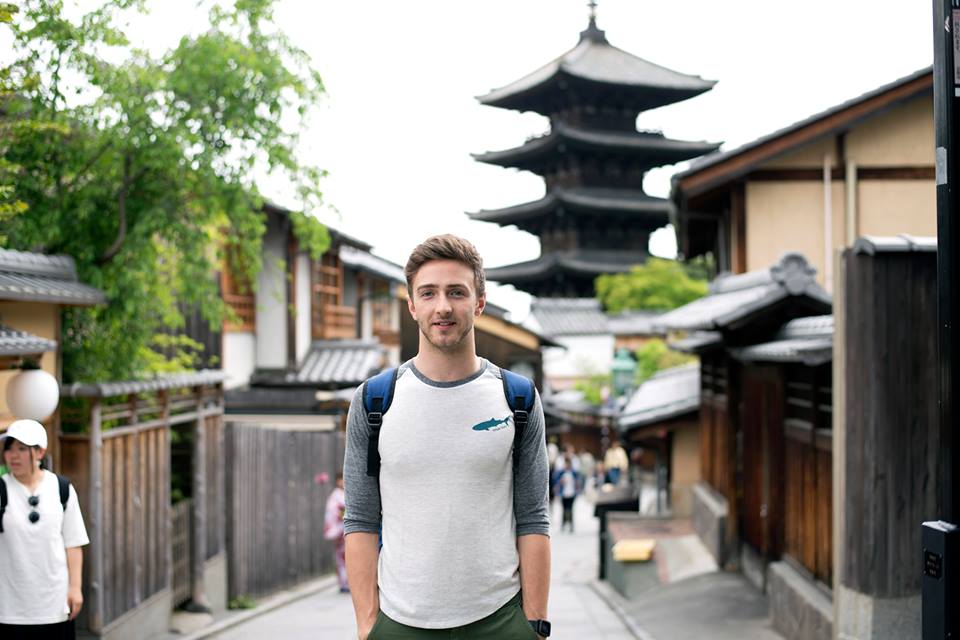From lecture halls at Texas A&M to teaching English in Japan
A former student in the Department of Agricultural Economics shares world experiences since graduating
Chase Dorsett ’16, a Waxahachie native and former student in the Department of Agricultural Economics within the Texas A&M College of Agriculture and Life Sciences, knew from a young age he wanted to be a world traveler.

His curiosity to learn about the many different cultures and wonders of the world, paired with his studies in entrepreneurship, led him to some interesting international opportunities.
After graduating from Texas A&M, he started his journeys across the globe. Through his travels, Dorsett had the opportunity to teach English in Fukushima, Japan. Today, he lives in London as a freelance market research analyst and real estate investor.
Dorsett took the time to sit down with us to share his story of traveling the world post-graduation and offer his advice for current students looking to pursue their dreams after college.
Why did you choose to attend Texas A&M, specifically the College of Agriculture and Life Sciences?
The College has welcoming staff, students and renowned academics, which were big pulls for me. My interest in the College of Agriculture and Life Sciences grew after my advisor informed me of a degree that focused on entrepreneurship. It was after that conversation that I knew I had to enroll.
What can you tell us about your post-graduation journey across the world?
Since I was a young kid, I knew I wanted to travel. I’ve always been curious about people and their cultures in other parts of the world.
Through one of my world geography classes I had the chance to learn about unique Asian cultures. That experience helped me travel across every inch of Japan years later when I decided to move there.
It’s fascinating to me to see how people get by in their day-to-day lives. One of the biggest lessons I’ve learned through traveling is that we are all very similar despite our differences.
So far, since graduating college, I have visited 42 countries, and by the end of the year, that number should be at least 50. I recently completed a six-month trip to Asia, visiting Qatar, South Korea, Japan, Taiwan, Vietnam, Cambodia, Laos, Thailand, Indonesia, Singapore and Malaysia.
Some of my favorite memories of my adventures include meeting my life partner in Tokyo Station and taking mud baths with elephants in Thailand. A baby elephant in the family held my hand with his trunk during our walk together to the mud baths. It was truly a magical experience.
How have you been able to apply what you learned in your undergraduate degree to your everyday life?
The classes I took and the professors I had at Texas A&M, particularly my classes within the entrepreneurship program, taught me to dig deep to be able to understand what it is I want most from my career and life. They taught me to be adaptable to life’s ever-changing circumstances.
It is through my experiences both in my education and traveling that I have learned that I prefer flexibility and independence over stability or status. I took that insight and used it to find a job, where I now currently work, that allows me that independence.
In your own words, how do you feel your degree helped you succeed in your career?
Undoubtedly, the courses I took during my time spent at Texas A&M have helped me succeed in my current and previous roles — particularly my classes with Ed Rister, Ph.D., director of the Agribusiness Entrepreneurship Program, and Frederick Boadu, Ph.D.
Dr. Rister is a cornerstone in preparing students for reality through his courses in agribusiness and entrepreneurship. And Dr. Boadu gave me the opportunity of a lifetime to visit his home country of Ghana through a study-abroad trip. Though classified as study abroad, it was so much more. From seeing a parliamentary court case in the capital of Accra to visiting a local farm that specialized in capturing grasscutters, also known as the greater cane rat, we experienced quite a lot of interesting local culture.
As I was studying American sign language at this time, our professor, Dr. Boadu, was so kind and generous to squeeze a visit to a local school for deaf children into our already packed schedule — a definite highlight of the trip.
If you can study abroad in such a foreign land, I highly recommend at least considering it. It could change your life.
Do you have any advice for current agricultural economics students?
No. 1 — Get your degree – it truly opens doors.
No. 2 — Travel to places outside of your comfort zone. At least try it a few times to expand your thoughts and interact with people who you usually would not.
No. 3 — Do not be afraid to take calculated risks.
**Current Department of Agricultural Economics student Kaitlynn Hughes contributed to this story.


